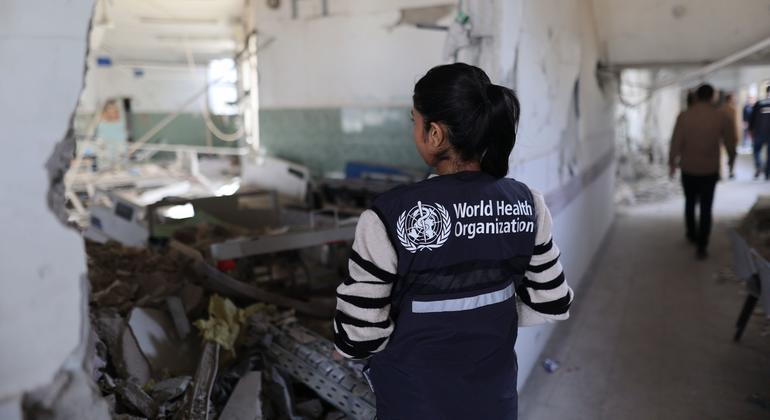Speaking of Gaza, whose representative Rik Peeperkorn described a scene of generalized destruction, outdated medical facilities and growing mental health needs, because the population of the enclave gradually returns to what remains of their homes after near 16 months of conflict.
“Everyone in Gaza is affected … stress, anxiety, depression and loneliness. It is everywhere, ”he said, highlighting the psychological assessment of residents and health workers.
Barely operational hospitals
Before the war, Gaza had more than 3,500 hospital beds. Today, there are only 1,900 left, and very little intensive care units (USI) and incubators for newborns, leaving medical staff who have trouble dealing with critical cases.
Even before the war, mental health services were limited, with a single psychiatric hospital, six community centers and a network of NGOs providing support. Now these installations are either destroyed or not functional.
The situation is particularly worrying in the north of Gaza, where only two psychiatrists remain. In addition, a single hospital remains partially functional in the region, and the others destroyed or seriously damaged.
“Jabalya is like a wasteland. Destruction … is out of belief, “he added.
Painfully slow evacuations
Dr. Peeperkorn has also said that the medical evacuations of seriously ill and injured patients started, with 35 to 40 patients transferred daily.
“It is incredibly important that we accelerated this and accelerated this,” he said, stressing that, according to WHO estimates, between 12,000 and 14,000 patients must be evacuated from Gaza, including at least 5,000 children.
Among the total estimated patients, about half suffer from injuries related to trauma while others need urgent treatment for chronic conditions such as cancer and cardiovascular disease.
Dr. Peeperkorn called for the urgent reopening of additional medical corridors, in particular the “traditional reference path” of the West Bank and East Jerusalem, where the facilities are ready to receive patients.
Critical infrastructure, including electricity networks, have undergone significant damage in the Gaza Strip.
Broader humanitarian situation
Beyond the casualness of health, the broader humanitarian situation in Gaza remains critical, with serious shortages of drinking water, food and essential services.
The United Nations Emergency Rescue Coordinator Tom Fletcher visited the enclave on Thursday, while United Nations agencies and partners continue to meet immense needs, said a UN spokesperson.
“In Northern Gaza, Mr. Fletcher has toured two hospitals – Al Shifa to Gaza City and Al Awda in Jabalya – where he met patients, staff and management,” said Farhan Haq, deputy spokesperson From the UN, during a press briefing in New York.
“Leaving Al Awda hospital, he spoke with survivors and returnees to Jabalya who try to rebuild their lives in the middle of the rubble.”
Acute shortages
Mr. Haq also reported that water shortages remain particularly acute. The only operating water well in North Gaza, managed by the emergency and work agency (UNRWA), serves as a crucial water rescue buoy.
However, the general destruction of infrastructure has left many residents without reliable access. Humanitarian partners distribute 2,500 cubic meters of drinking water daily, reaching around 411,000 people, but that remains well below real needs.
A partner organization also provides cleaning and sanitation services in 17 travel sites in northern Gaza, benefiting nearly 12,000 displaced people.
“Water, sanitation and hygiene partners perform evaluations in places through the strip to repair water wells, install dosage pumps and set up filling points Water, “said Mr. Haq, adding:” Although certain repairs are already underway, progress further depends on the teams that can erase debris and carry out explosive dangers assessments. »»
Wood challenges
Meanwhile, in the West Bank, Israeli military operations intensified in Jenin, Tulkarm and Tobas, seriously restricting Palestinian access to essential help, including water, food, medicines and supplies for infants .
In the governorate of snorkels, Israeli forces have been operating in the refugee camp in El Far’a for five consecutive days, Haq reported.
“They imposed a curfew, prohibiting residents from leaving their homes. They also bulldozed the roads and damaged the water networks, forcing residents to count on the collection of rainwater. »»




